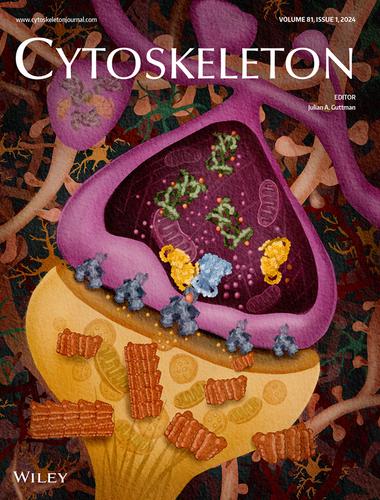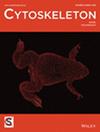Back Cover Image
IF 2.4
4区 生物学
Q4 CELL BIOLOGY
引用次数: 0
Abstract
ON THE BACK COVER: Schematic illustration that shows: In pathology, Tau (in green) targets the tyrosine kinase Fyn (yellow) to dendritic spines, where it phosphorylates subunit NR2b of the NMDA receptor (NMDAR, dark blue at the postsynaptic density), which leads to recruitment of PSD-95 (light blue) and formation of NMDAR/PSD95 complexes. Aβ oligomers (orange, extracellular) induce excitotoxicity by signalling through NMDAR/PSD95 complexes.
Credit: Alison Carlisle, Queensland Brain Institute, The University of Queensland.

封底图片
封底:示意图显示:在病理过程中,Tau(绿色)将酪氨酸激酶 Fyn(黄色)靶向树突棘,使 NMDA 受体(NMDAR,突触后密度处为深蓝色)的 NR2b 亚基磷酸化,从而招募 PSD-95(浅蓝色)并形成 NMDAR/PSD95 复合物。Aβ 寡聚体(橙色,细胞外)通过 NMDAR/PSD95 复合物信号诱导兴奋毒性。
本文章由计算机程序翻译,如有差异,请以英文原文为准。
求助全文
约1分钟内获得全文
求助全文
来源期刊

Cytoskeleton
CELL BIOLOGY-
CiteScore
5.50
自引率
3.40%
发文量
24
审稿时长
6-12 weeks
期刊介绍:
Cytoskeleton focuses on all aspects of cytoskeletal research in healthy and diseased states, spanning genetic and cell biological observations, biochemical, biophysical and structural studies, mathematical modeling and theory. This includes, but is certainly not limited to, classic polymer systems of eukaryotic cells and their structural sites of attachment on membranes and organelles, as well as the bacterial cytoskeleton, the nucleoskeleton, and uncoventional polymer systems with structural/organizational roles. Cytoskeleton is published in 12 issues annually, and special issues will be dedicated to especially-active or newly-emerging areas of cytoskeletal research.
 求助内容:
求助内容: 应助结果提醒方式:
应助结果提醒方式:


